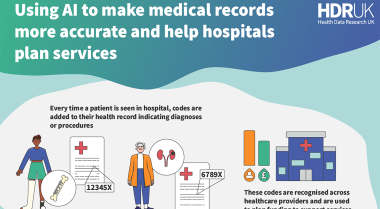Educational and health outcomes of schoolchildren in local authority care in Scotland: A retrospective record linkage study
20 April 2022
The start that children experience in life can have a profound impact on their future prospects. Small studies have shown that children in care are more likely to be absent from school and have higher mortality. New research using nationwide data in Scotland shows the wider extent of the differences between children in care and their peers.

Overview
The start that children experience in life can have a profound impact on their future prospects. Small studies have shown that children in care are more likely to be absent from school and have higher mortality. New research using nationwide data in Scotland shows the wider extent of the differences between children in care and their peers.
The challenge
Children who are placed in the care of their local authority, or looked after children, typically have poorer outcomes in later life. They may enter care due to neglect, risk of abuse, child or parental disability, or involvement in crime.
Previous research has found that these children have poorer educational outcomes and mental and physical health. However, as education and health can affect one another, it can be difficult to separate the underlying causes of these differences. Untangling cause and effect could have a significant impact on policies aimed at reducing the disadvantages experienced by looked after children.
Most studies comparing educational or health outcomes between children in care and their peers have used small samples. Meanwhile, larger studies have focussed on a few measurements, such as absenteeism or exclusion, without adjusting for poorer health. Recent reviews of the existing research highlighted the need for more work at a population level.
The solution
During his HDR UK fellowship, Michael Fleming at University of Glasgow analysed linked data from nine Scotland-wide databases to compare a broad range of educational and health outcomes of looked after children against their peers. This included data on over 700,000 children attending Scottish schools between 2009 and 2012, of which almost 14,000 were in care. With the extensive information available, the results could be adjusted for confounding sociodemographic, maternity and comorbidity factors.
The analysis, published in PLOS Medicine, is the first time that these outcomes of children in care have been compared at a population level.
Impact and outcomes
The study found that looked after children had an increased risk of school absenteeism and exclusion, special educational needs, poor academic attainment, unemployment, hospitalisation and mortality, and treatment for epilepsy, attention deficit hyperactivity disorder, depression and neurodevelopmental multimorbidity.
The study also compared children being cared for at home, for instance with an adoptive family or relatives, and those who were away from home in residential institutions. Those looked after away from home had less absenteeism, less exclusion, less unemployment, and better attainment. Further research would be needed, however, to understand potential factors that influence these differences, including underlying reasons for entering care.
Dr Fleming said:
“Education can impact health directly but also indirectly and the two are very interlinked. For example, many factors, including poor health, can lead to poorer performance at school which in turn can lead to poorer health and wellbeing in later life. Building on my previous research looking at outcomes among children with chronic conditions and neurodevelopmental multimorbidity, I wanted to investigate what types of health and educational outcomes were occurring in this particularly vulnerable group of children.”
Impact committee
The impact committee selected this paper because of its value in informing policy for looking after vulnerable children. These children have been overlooked in other research and this work will help to improve their care. The prospect that care away from home could lead to better education results will be important for policy decisions.



